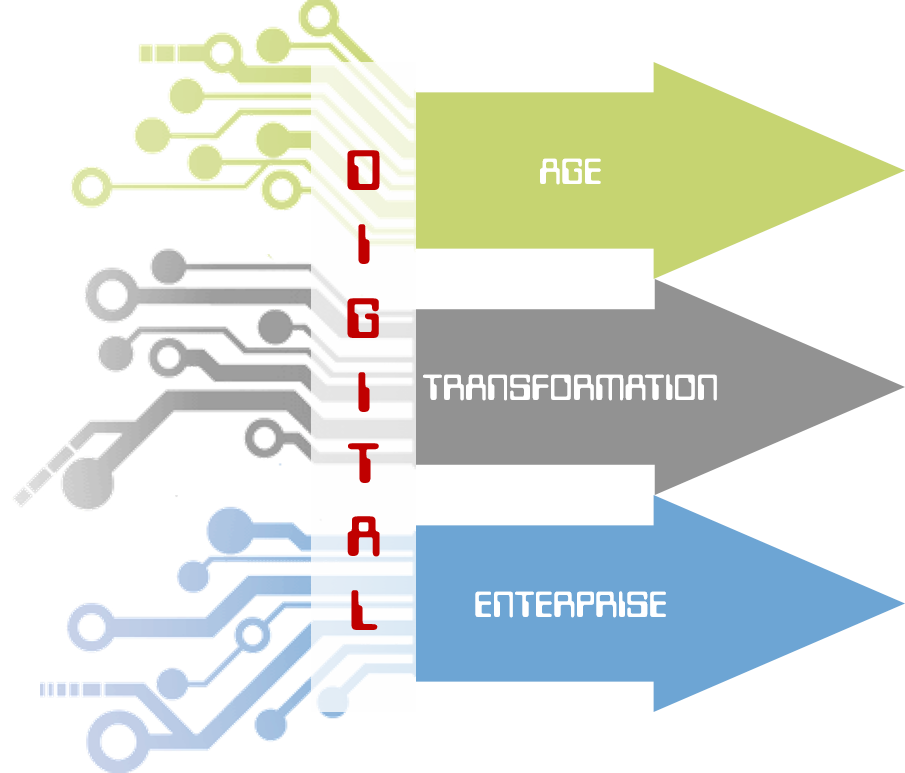Kernels of truth are often found in idioms. One such idiom advises us to “keep in step with the times.” As I wrote in a previous article, “Generally speaking, that’s pretty good advice. Companies failing to adapt over time have filled history’s dustbin. Going out of business probably wasn’t their goal; but, they discovered change is seldom easy.”[1] One reason companies fail to keep step with the times is their inability to identify exactly what the “times” are. Today, that shouldn’t be a problem — we live in the Digital Age. As a result, business analysts continue to insist Industrial Age companies need to transform into digital enterprises. Lone voices from years past have now turned into a chorus of analysts pushing the need for digital transformation.
Digital transformation is not a passing fad
John Kennedy (@MrJohnFKennedy), an award-winning technology journalist, acknowledges there has been a lot of hype about digital technologies and digital transformation. Hype, however, doesn’t always reflect reality. He reminds us of the dot.com era as a case in point. Nearly two decades on, however, he writes, “We are in the age of automation and tech just has a way of creeping up on you after all the marketing bluster has died down.”[2] He adds, “Digitalization or business transformation, whatever you want to call it, isn’t just about transforming a set of processes through apps, APIs and servers; it is about transforming people, too, at every facet of the organization. This ‘digital transformation’ term beloved by marketers is pretty much a good way to describe the last 10 or 20 years of life.” There are two lessons to be drawn from Kennedy’s comments. First, digital transformation isn’t just about technology; and, second, digital transformation has been taking place for some time. There is a third lesson companies need to understand: Digital transformation means something different for every company. As Nigel Fenwick (@NigelFenwick), a Vice President and Principal Analyst at Forrester notes, “Every business is different.”[3]
Mark Samuels (@mark_samuels), a business journalist, agrees with Kennedy that digital transformation involves every aspect of a company, not just the technology it employs. He explains, “Digital transformation involves using digital technologies to remake a process to become more efficient or effective. The idea is to use technology not just to replicate an existing service in a digital form, but to use technology to transform that service into something significantly better. Digital transformation can involve many different technologies but the hottest topics right now are cloud computing, the Internet of Things, big data, and artificial intelligence. But it’s not just about the technology: changing business processes and corporate culture are just as vital to the success of these initiatives.”[4] Transformation is defined as “a thorough or dramatic change in form or appearance.” To demonstrate the breadth and depth of digital transformation, Fenwick discusses three “ecosystems” that must be thoroughly understood if transformation is to take place. He explains, “Business transformation is accelerated by, and built upon digital ecosystems: the customer’s personal value ecosystem, digital experience ecosystems, and digital operations ecosystems. He goes on to explain a little more about each of those ecosystems. He writes:
The customer’s personal value ecosystem. “The customer’s personal value ecosystem is unique to each customer. It’s represented by the unique collection of digital apps each customer assembles with their smart devices. The apps they use most frequently are also the most capable of delivering an outcome of value. … Customers like you and I expect better digital experiences because of all the digital apps we use in our day-to-day lives.”
Digital experience ecosystems. “Digital experience ecosystems help firms deliver on customers’ desires. … Forrester defines the customer experience (CX) ecosystem as the web of relations among all aspects of a company — including its customers, employees, partners, and operating environment — that determine the quality of the customer experience. … While each company may assume it plays a distinctive role for their customer, from the customer’s perspective value is created when they achieve the outcome they most desire. … When evolving into a digital business, you must consider markets outside of your own immediate business — because the digital leader of those markets will not only shape your customer’s expectations, they may well be competing with you very soon.”
Digital operations ecosystems. “Digital operations ecosystems increase operational agility in service of customers. Behind the scenes, businesses assemble myriad capabilities to support their business model — increasingly the digital components of such business capabilities integrate the business with other companies in the market to create an operational ecosystem, with each company dependent upon others for survival. While the ultimate focus of this ecosystem is creating customer value, it’s more immediate effect is to drive operational agility in service of customers.”
Stephanie Overby (@stephanieoverby) bluntly states, “Addressing digital disruption is no longer a choice; it’s an imperative.”[5] Like Fenwick, Overby insists digital transformation means different things for every business. In other words, companies need to identify and understand which digital business model best suits their needs. Determining which business model is the best fit for companies is the subject of a book by MIT’s Stephanie L. Woerner and Peter Weill entitled What’s Your Digital Business Model: Six Questions to Help You Build the Next Generation Enterprise. Woerner and Weill describe four different business models, each with a different focus: 1) Transformation focusing on building platforms, consolidating data, and integrating silos; 2) transformation focusing on omnichannel customer experience as their primary source of competitive advantage; 3) transformation focusing on digital value; and 4) transformation focusing on pursuing ecosystems. Woerner and Weill insist each business model requires a different kinds of transformation champion and leadership. Companies focusing on the wrong business model for their industry are doomed either to fail or lose market share.
Summary
Too many company executives perceive digital transformation as a metamorphosis, like a caterpillar turning into a butterfly. Fenwick believes they should view it as continuous evolution rather a metamorphosis. He writes, “Many people make the mistake of thinking of digital transformation as a series of projects. But true transformation is a journey, not a destination. Responding to rising customer expectations demands a state of continuous evolution.” Kennedy agrees with that sentiment. Customers’ tastes and preferences change and companies need to change with them. He adds, “In a world of billions of people carrying billions of smartphones — now the core computing device for the planet — getting to that sense of uniqueness for every customer is what will enable the mantra of customer success to become a core philosophy of business. At the heart of it will be automation and AI. It’s not so much digital transformation as it is business transformation.” Success involves gathering the right data, analyzing it with the right capabilities, and applying it to the right business model.
Footnotes
[1] Stephen DeAngelis, “Creating a Supply Chain that Keeps in Step with the Times,” Enterra Insights, 9 April 2018.
[2] John Fintan Kennedy, “Age of automation: Is digital transformation just a fad?” Siliconrepublic, 14 May 2018.
[3] Nigel Fenwick, “The Four New Rules of Business,” Forrester, 30 November 2017.
[4] Mark Samuels, “What is digital transformation? Everything you need to know about how technology is reshaping business,” ZDNet, 22 May 2018.
[5] Stephanie Overby, “Digital transformation: 5 lessons on finding the right business model,” The Enterprisers Project, 23 May 2018.





